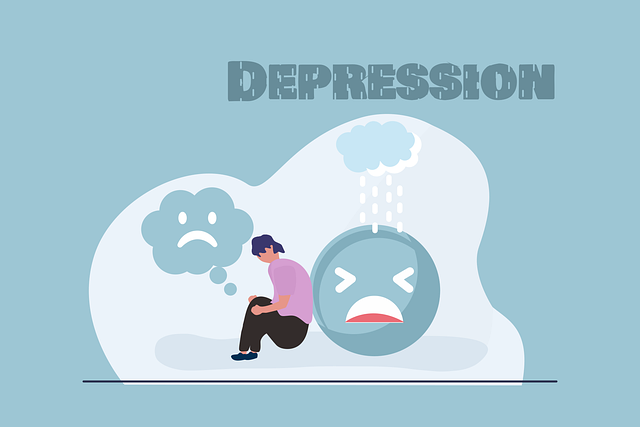Emotional Intelligence (EI), as emphasized by Lone Tree Divorce Therapy, is crucial for personal growth and navigating challenges. Key components include self-awareness, empathy, and effective communication strategies. Through practicing emotional healing, mindfulness techniques, and active listening, individuals can improve relationships, enhance mental health, and build resilience during life transitions like divorce. Lone Tree Divorce Therapy prioritizes these skills to foster deeper connections and support clients in complex social landscapes.
Emotional intelligence (EI) is a powerful tool for personal growth, especially in navigating complex life transitions like divorce. This article explores EI’s impact and offers practical strategies from Lone Tree Divorce Therapy. We’ll delve into key aspects such as self-awareness, empathy, emotion management, and active listening—essential skills to foster healthy relationships post-divorce. By understanding and regulating emotions, you can navigate this new chapter with resilience and compassion.
- Understanding Emotional Intelligence and its Impact on Personal Growth
- The Role of Self-Awareness in Building Emotional Intelligence
- Developing Empathy: A Cornerstone of Effective Communication
- Managing Emotions: Strategies for Regulating and Responding to Feelings
- Practicing Active Listening: Enhancing Connections through Understanding
Understanding Emotional Intelligence and its Impact on Personal Growth

Emotional intelligence (EI) is a powerful tool for personal growth and well-being, as recognized by Lone Tree Divorce Therapy experts. It involves understanding, managing, and leveraging one’s own emotions and those of others to navigate relationships and life challenges effectively. EI goes beyond mere emotional awareness; it encompasses skills like self-regulation, empathy, and social awareness, all of which contribute to enhanced mental health and resilience.
Developing emotional intelligence can be a transformative journey, as highlighted by Mental Health Education Programs Design. It involves embracing Mind Over Matter principles to cultivate self-awareness, practice Emotional Healing Processes, and build healthier relationships. By integrating these practices into daily life, individuals can foster better communication, strengthen connections, and achieve greater satisfaction in both personal and professional spheres.
The Role of Self-Awareness in Building Emotional Intelligence

Emotional intelligence (EI) is a cornerstone for personal growth and successful relationships, especially during challenging times like those experienced by individuals navigating a Lone Tree Divorce Therapy. At the heart of EI development lies self-awareness—the ability to recognize and understand one’s emotions. This innate capacity serves as a compass, guiding individuals through life’s complexities. By cultivating self-awareness, people can better comprehend their emotional triggers, strengths, and weaknesses. Such introspection enables them to respond thoughtfully rather than reacting impulsively during stressful situations or conflicts, be it at home, work, or within the context of Conflict Resolution Techniques.
Furthermore, increased self-awareness empowers individuals to employ effective Communication Strategies and Stress Reduction Methods. They become more attuned to their emotional needs, enabling them to express themselves honestly yet empathetically. This depth of understanding fosters healthier connections with others, promotes better problem-solving skills, and contributes significantly to overall well-being. In essence, self-awareness serves as a foundational layer in the intricate mosaic that is emotional intelligence development.
Developing Empathy: A Cornerstone of Effective Communication

Developing empathy is a cornerstone for effective communication and emotional intelligence building. It involves understanding and sharing the feelings of another, fostering deeper connections. Lone Tree Divorce Therapy recognizes the profound impact this skill has on navigating complex relationships, especially during challenging times like divorce. By cultivating empathy, individuals can offer solace, validate others’ emotions, and build bridges of trust, making the healing process more accessible.
This ability is not innate but can be cultivated through practices such as active listening, mental wellness journaling exercises, and confidence-boosting guidance. Stress Management Workshops Organization programs often emphasize this aspect, teaching participants to recognize non-verbal cues and respond with genuine concern. Through these efforts, individuals become more attuned to their own emotions and those of others, leading to improved interpersonal relationships.
Managing Emotions: Strategies for Regulating and Responding to Feelings

Managing emotions effectively is a cornerstone of emotional intelligence development, especially for individuals navigating life transitions like divorce. Lone Tree Divorce Therapy emphasizes strategies to regulate and respond to feelings healthily. Therapists guide clients in identifying emotional triggers and teaching them techniques to calm their minds and bodies during stressful situations. This process involves deep breathing exercises, mindfulness practices, and cognitive reframing—skills that empower individuals to navigate the emotional landscape of divorce with resilience.
Cultural sensitivity in mental healthcare practice plays a vital role in these strategies. Therapists are trained to be aware of and respect diverse cultural beliefs about emotions, ensuring inclusive communication strategies. Public awareness campaigns development can also support this process by educating the community about emotional intelligence and its benefits, fostering a supportive environment for individuals seeking therapy during life’s challenges.
Practicing Active Listening: Enhancing Connections through Understanding

In today’s complex social landscape, active listening serves as a potent tool for building emotional intelligence, especially within the context of Lone Tree Divorce Therapy. This practice transcends mere hearing; it involves deeply engaging with another person’s words, emotions, and experiences to foster a sense of understanding and connection. By actively listening, therapists can create a safe and supportive environment, enabling clients to express their feelings freely and work through sensitive issues. This empathetic approach not only strengthens the therapist-client relationship but also enhances the therapeutic process itself.
Emotional intelligence, as highlighted in the Risk Assessment for Mental Health Professionals, is a critical aspect of effective therapy. Active listening contributes significantly to this by allowing mental health professionals to recognize and respond appropriately to clients’ emotional cues. Moreover, this skill aids in stress management, as it promotes a deeper understanding of clients’ struggles and allows therapists to offer tailored support. In the intricate web of divorce therapy, where emotions can run high, active listening becomes an invaluable asset, ensuring that every conversation is a step towards healing and resolution.
Emotional intelligence is a powerful tool for personal growth, fostering healthier relationships, and navigating life’s challenges with resilience. By understanding and practicing the techniques outlined in this article—from self-awareness and empathy to active listening—individuals can enhance their emotional literacy, improve communication, and ultimately lead more fulfilling lives. Lone Tree Divorce Therapy emphasizes these principles, recognizing that building emotional intelligence is crucial for personal transformation and healing during life’s transitions.












